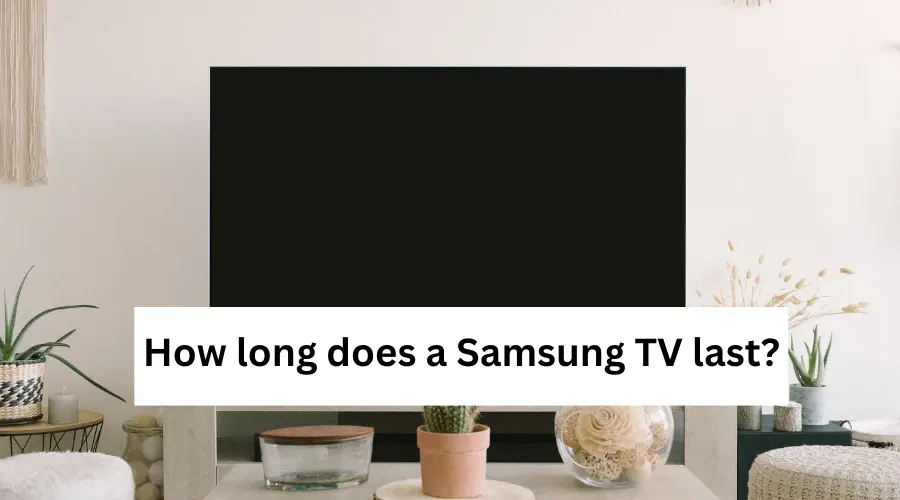Are you in the market for a new TV? It can be a daunting task to sift through all the options and make the right choice. But when it comes to Samsung TVs, you can breathe a sigh of relief.
With their impressive picture quality and abundance of features, Samsung TVs are a popular choice for many.
But, have you ever wondered how long they actually last? Well, wonder no more!
Stick around as I dive into the lifespan of Samsung TVs and what you can expect from these high-quality devices.

Key Takeaways
- Samsung’s standard LCD and LED TVs can last for an average of 4 to 8 years with proper care.
- Samsung QLED TVs can last for over 10 years with heavy use.
- Individual usage patterns, environmental factors, and maintenance practices can affect the lifespan of a Samsung TV.
How long does a Samsung TV last?
Samsung LED TVs can last for 4 to 8 years with heavy usage. Samsung OLED/QLED TVs can last up to 10 years of heavy usage without any disturbances.
Note: The lifespan of these Samsung TVs may vary on the TV of the Panel, be it LED, OLED, or QLED.
Samsung Smart TV provides high-quality entertainment having versatile features to add to its increasing popularity. People are addicted to its usage not only for the entertainment package it offers but also due to its handy technical effects.
This is the average lifespan of a Samsung Smart TV. Of course, there are always exceptions to the rule. We’ve heard of people who have had their Samsung TVs for 15 years or more. And then there are those unlucky few who have had to replace their television after only a couple of years.
Proper handling of your Samsung TV can last longer than this time frame. As per critical analysis, this TV is well worth your money with its longevity.
Does Samsung TV last longer than an Average TV?
When it comes to TV brands, Samsung stands out for using higher quality components, which may contribute to their longer lifespan compared to cheaper brands. In fact, Samsung TVs can last up to 10 years with lighter usage and proper maintenance, which is similar to the lifespan of an average TV.
However, it’s important to note that the lifespan of any TV can be influenced by various factors, such as usage frequency, brightness settings, weather exposure, power supply, and design. With heavy usage, Samsung TVs typically last between 4.5 to 7 years.
Overall, Samsung is renowned for producing high-quality TVs with a range of high-definition effects. So, if you’re looking for a TV that can last for years to come, a Samsung TV may be a great investment.
Factors that impact the lifespan of Samsung Smart TV
The lifespan of your Samsung Smart TV can be affected by several factors. Here are some of the most important ones to consider:
- Usage: The more you use your TV, the faster it may wear out. To extend its lifespan, use it in moderation and avoid leaving it on for long periods when not in use.
- Environment: High temperatures, humidity, and dust can all impact your TV’s components and cause them to degrade more quickly. Use your TV in a clean, dry environment and avoid exposing it to extreme temperatures.
- Maintenance: Proper maintenance is important to extend the lifespan of your TV. Clean the TV regularly with a soft, dry cloth and ensure it has proper ventilation to prevent overheating.
- Quality: Higher quality TVs are generally built with better components and are designed to last longer. When purchasing a Samsung Smart TV, consider the TV’s build quality, the quality of its components, and the warranty that comes with it.
When should I replace my Samsung TV?
You can replace Samsung TV on average every 4 to 7 years. New models of Samsung TVs are launched each day. These new ventures are smarter, better, and budget-friendly.
Features like 4K or 8K resolution, Dolby Atmos, or lifestyle features like Ambient or Art Mode are trending.
Personal preferences, budget, or habit play big time into your decision of replacing the TV you are currently enjoying.
Most importantly the time should be considered how much time you are spending watching TV. If you don’t watch much, then you will likely not need to replace your TV as often
What are the signs your TV is going out?
Your TV generally gives a few warning signs that things are about to end soon for its proper working.
However, a broken screen or your TV not turning on no matter what you do is something beyond repair. You should not wait for its fixation but checkout for a new set.
There are certain facts that signal your TV’s malfunctioning.
- Dead Pixels
- Colour Distortion
- Bars and Lines
- Image Retention
- Fuzzy Screen
- Fading Screen
How long is the Warranty of Samsung TV?
Samsung TV comes with a one-year warranty. In case your device stops working you should take assistance from a Samsung warranty claim.
Although expensive, they are reliable. Samsung warranty shall work to fix your problem as soon as possible.
If your Samsung TV is under warranty and needs to be replaced Samsung will do that as your investment is protected.
The Samsung Authorised Services will only cover manufacturing defects. The warranties will cover parts and services which require documentation of the problem.
Damages resulting from misuse, natural disasters, or accidents are not covered by warranties.
For such consequences, you should have an extended warranty or find a storage-bought protection plan.
How to make your Samsung TV last longer?
TV fades with age, no matter if it is an expensive brand or a less well-known brand. Samsung TV normally lasts longer because of the higher quality hardware components used.
However, it is safe to assume that few maintenance effects can get you the maximum mileage from your newly purchased TV. Here are the steps you can follow to make your Samsung TV last longer:
Regularly Ensure Your TV Is Dust Free
Dust can intrude into your Smart TV and cause harm to the components inside affecting the life of your TV. Settled dust, left long, can leave permanent marks on your Samsung TV screen.
Ensure periodical cleaning using a microfiber cloth to avoid scratches. For cleaning inside your TV use canned air. Perhaps it’s advisable to hire an expert for the purpose rather than doing it yourself.
Regular Software Update
Regular software updates can also help to improve the performance and lifespan of your Samsung TV. These updates often include bug fixes and security patches that can help to prevent issues and ensure that your TV is running smoothly.
Use A Voltage Regulator
Voltage regulators protect your Samsung TV from voltage fluctuations and electrical surges.
Such voltage stabilizers prolong the life of your Samsung Smart TV. A voltage fluctuation can decrease or increase the amount of voltage going into your device which is damaging to your TV set.
Figuring out the Watts of your TV you can get a single-phase stabilizer. It has light indicators to show what voltage your device is using both off and on.
Avoid Exposing Samsung TV to Extreme Temperature/Keeping Heavy Objects on Top
It is recommended to avoid exposing your Samsung TV to extreme temperatures or humidity, as this can also damage the components inside. It is also important to avoid placing any heavy objects on top of the TV or pushing on the screen, as this can cause cracks or other damage.
Keeping It Off When Not Needed
It is important to use your Samsung TV responsibly and avoid leaving it on for extended periods of time when not in use. This can help to reduce wear and tear on the components and extend the overall lifespan of the device.
Is it worth getting a Samsung TV repaired?
Yes, it can be worth repairing an old Samsung Smart TV depending on the issue and the cost of repair.
When deciding whether to repair an old Smart TV, it’s important to consider the cost of repair versus the cost of a new Samsung TV. If the repair cost is significantly less than the cost of a new TV, then repairing the old Smart TV may be the more economical choice.
Additionally, if the issue with the Samsung TV is minor and can be easily fixed, such as a broken HDMI port or a faulty power supply, then repairing the TV may be a quick and easy solution.
However, if the cost of repair is close to or more than the cost of a new Samsung TV, then it may not be worth repairing the old Smart TV.
Another factor to consider is the age of the Samsung TV. If the TV is several years old and has already required multiple repairs, then it may be more practical to invest in a new TV that will likely last longer and require less maintenance.
Overall, whether it’s worth repairing an old Smart TV depends on the specific issue and the cost of repair compared to the cost of a new Samsung TV. It’s important to weigh the pros and cons and make an informed decision based on individual circumstances.
FAQs
When should I replace my Samsung TV?
How do you know if Samsung TV is going bad?
How long do Samsung Qled TVs last?
How long does a Samsung 55-inch TV last?

I’m Anirban Saha, Founder & Editor of TechBullish. With a B.Tech in Electronics and Communication Engineering, and 5+ years of experience as a software developer, I have expertise in electronics, software development, gadgets, and computer peripherals. I love sharing my knowledge through informational articles, how-to guides, and troubleshooting tips for Peripherals, Smart TVs, Streaming Solutions, and more here. Check Anirban’s Crunchbase Profile here.
